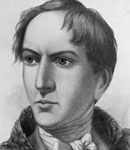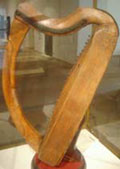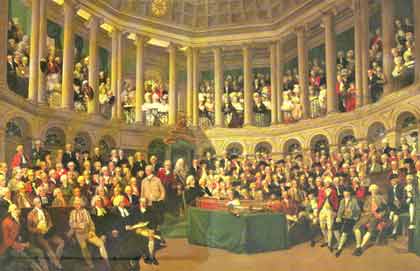On a simple narrative level, The Minstrel Boy is the story of a young man who goes off to fight for Irish freedom.
Minstrel Boy
Videos
Lyrics and chords
His mission is to defend his country with his sword and sing its praises with his harp.
When he falls in battle, he tears the strings from his harp, preferring to destroy it than let it fall into the hands of the enemy – a fate he regards as tantamount to being subjected to slavery.
However, the song works on a deeper level than the purely narrative.
The Minstrel Boy as the idealistic patriot
The Minstrel Boy was written by Thomas Moore who used the idea of the warrior musician to symbolise a kind of patriot that was to be found again and again in every Irish rebellion spanning more than a hundred years.
The kind of person Moore had in mind was young, idealistic, probably naïve, certainly not well acquainted with warfare and yet, in spite of this, the kind of person who was passionately devoted to defending Ireland and achieving Irish nationalism.
Moore met many idealistic patriots at Trinity College

He would have come across several such people during his time as a student at Trinity College Dublin.
It was there that Moore met Robert Emmet, an idealistic patriot who led an unsuccessful rebellion in 1803.
The patriots Moore associated with were often from well to do backgrounds. They were poets, academics and dreamers rather than soldiers.
Minstrel Boy, like many rebels, lacked experience
The Minstrel Boy, like the idealistic Irish rebels he represented, lacked experience of warfare.
Remember, for most of the 19th century, most of Ireland’s military talent was absorbed into the British army and sent off to fight British wars. The men who were left behind to fight for Irish freedom were certainly brave and devoted, but they weren’t really soldiers.
This was true at the time of the 1867 Fenian Rising and1916 Easter Rising, and it was certainly true when Moore was young at the start of the 19th century.
It was largely well meaning but inexperienced idealists who had fought in the 1798 Rebellion, and again a few years later in the abortive Emmet Rebellion in 1803. Emmet was later executed by the British.
Minstrel Boy represents the devoted but amateur rebel
Moore uses The Minstrel Boy to represent these idealist young patriots. The very fact that he is a minstrel alerts us straightaway to the fact that he is not a soldier. He doesn’t even have his own sword, but has to borrow his father’s.
What he lacks in experience, he makes for by his selfless devotion and his readiness to sacrifice everything for his country, Ireland – the land of song as Moore calls it.
As the Minstrel Boy says: “though all the world betrays thee, one sword at least shall guard thy rights, one faithful harp shall praise thee”.
Minstrel Boy suffers same fate as Moore’s friends

But just as thousands of Irish patriots throughout history, he maintains a form of victory because the oppressor can not break his spirit.
Before he dies he turns to his harp, a symbol of Ireland, and tears away the strings – preferring to destroy it than to have it abused by the oppressor.
Its “songs were made for the pure and free,
They shall never sound in slavery.”
A subtle expression of Irish nationalist fervour
The Minstrel Boy is very subtle compared to some many other Irish nationalist songs. That subtlety and depth made it popular with more moderate nationalist opinion in Moore’s day and it also helped the song to appeal and be adopted by people in other countries.
It may be about Ireland but Ireland is never actually mentioned. Because there is no precise reference, the song can be applied to other countries where freedom is highly prized.

Minstrel Boy
Song Meaning
Videos
Lyrics and chords
